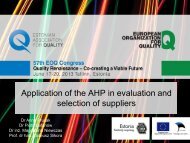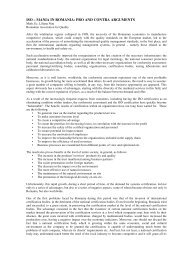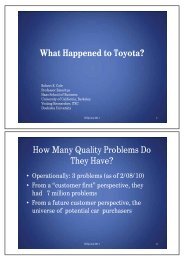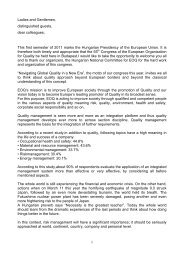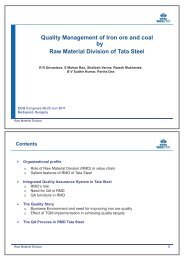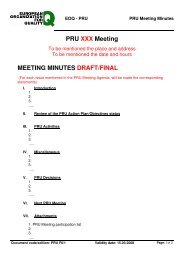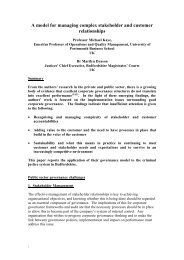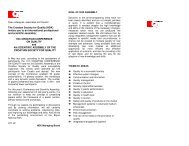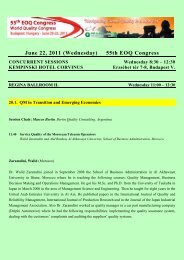Why National Accreditation Body? - European Organization for Quality
Why National Accreditation Body? - European Organization for Quality
Why National Accreditation Body? - European Organization for Quality
Create successful ePaper yourself
Turn your PDF publications into a flip-book with our unique Google optimized e-Paper software.
Schools of Science & Technology<br />
School Research Conference<br />
Investigating g g The Factors Affecting g The Development p<br />
Of A Sustainable <strong>National</strong> <strong>Accreditation</strong> <strong>Body</strong> For<br />
Engineering And Technology Laboratories In Libya<br />
Tarek Elsmuai and Christopher McCollin<br />
20 20-23 23 June, June 2011<br />
The international providers of accreditation.<br />
<strong>Accreditation</strong> bodies operating in accordance with ISO/IEC 17011:2004 do not have to offer<br />
accreditation to all types of CABs. (ISO/IEC 17011:2004)<br />
07 June 2011<br />
2
<strong>Why</strong> <strong>National</strong> <strong>Accreditation</strong> <strong>Body</strong>?<br />
and why Laboratory accreditation?<br />
07 June 2011<br />
1.<br />
2.<br />
3.<br />
4.<br />
5.<br />
66.<br />
7.<br />
8.<br />
07 June 2011<br />
STD. #<br />
ISO/IEC<br />
17011:2004<br />
ISO/IEC<br />
17025:2005<br />
ISO 15189:2007<br />
ISO/IEC<br />
17020:1998<br />
ISO/IEC<br />
17021:2006<br />
ISO/IEC<br />
17024:2003<br />
ISO/IEC Guide<br />
65:1996<br />
ISO/IEC<br />
17040:2005<br />
Standardisation<br />
General requirements <strong>for</strong> accreditation bodies accrediting<br />
con<strong>for</strong>mity assessment bodies<br />
General requirements <strong>for</strong> the competence of testing and<br />
calibration laboratories<br />
<strong>Accreditation</strong> of Medical Laboratories<br />
Inspection Bodies<br />
Requirements <strong>for</strong> bodies providing audit and certification of<br />
management systems<br />
certification program <strong>for</strong> individual persons<br />
bodies operating product certification systems<br />
General requirements <strong>for</strong> peer assessment of con<strong>for</strong>mity<br />
assessment bodies and accreditation bodies<br />
3<br />
4
Testing<br />
Laboratories<br />
ISO/IEC 17025<br />
Calibration<br />
Products<br />
<strong>Accreditation</strong> <strong>Body</strong><br />
ISO/IEC 17011<br />
CCertification tifi<br />
Certification<br />
ti <strong>Body</strong> B d IInspection Inspection ti <strong>Body</strong> B d<br />
ISO/IEC bodies 17021<br />
ISO/IEC bodies 17020<br />
Management<br />
ment<br />
Systems<br />
ISO 9000 ISO 14000<br />
EMAS<br />
Personnel<br />
<strong>Accreditation</strong> in Engineering<br />
Inspection Inspection<br />
• <strong>Accreditation</strong> is the procedure by which the competence of a<br />
calibration or test laboratory to per<strong>for</strong>m a specified range of tests or<br />
measurements is assured against national or international standards<br />
(Hibbert, 2007).<br />
• Through accreditation, an approved external testing institution<br />
certifies that a laboratory possesses the ability to carry out certain<br />
analysis (Funk, et al, 2007).<br />
• An accreditation body is established primarily to provide its services<br />
to its local market and to operate accreditation as a non profit<br />
distribution activity free from commercial motivation (Drnovsek,<br />
2008) 2008).<br />
• Bievre, (2008) believes that an accreditation wave is going over the<br />
world: get g accreditation or pperish.<br />
• Most countries have a single national accreditation body responsible<br />
<strong>for</strong> all areas of accreditation (Guasch, 2007).<br />
07 June 2011<br />
6
How it Works?.<br />
• Governments and industries depending on the results of a test laboratory to<br />
direct regulatory and corporate decisions.<br />
• There<strong>for</strong>e the data must be accurate and reliable.<br />
• Laboratory testing and calibration, calibration is essential in providing accurate outputs (i.e. (i e<br />
measurements and results) to fit their intended use, giving that very important<br />
decisions are based on them (Squirrell, 2008).<br />
Source: IEC, 2008<br />
07 June 2011<br />
“<strong>Accreditation</strong> Independency”<br />
• <strong>Accreditation</strong> programmes in both Brazil and Zambia have had significant<br />
problems due to overdependence on government involvement (Bukonda et al.<br />
2002).<br />
• In both instances accreditation programmes were developed at the request of<br />
government bodies, with international assistance.<br />
• It had not achieved independent status be<strong>for</strong>e changes in government decreased<br />
the support provided to the organisations.<br />
• The continuation of those programmes is in some doubt as a result.<br />
<strong>Accreditation</strong>" differs from "certification" by y adding g the concept p of a third<br />
party (<strong>Accreditation</strong> <strong>Body</strong>).<br />
07 June 2011<br />
7<br />
8
<strong>Accreditation</strong> by UKAS means that evaluators i.e. testing and<br />
calibration laboratories, certification and inspection bodies have been<br />
assessed against internationally recognised standards to demonstrate<br />
their competence, impartiality and per<strong>for</strong>mance capability.<br />
Suppliers<br />
(Management<br />
System)<br />
<strong>Accreditation</strong> <strong>Body</strong> <strong>Accreditation</strong> Service<br />
Con<strong>for</strong>mity Assessment Service Provider<br />
Calibration/<br />
Test Laboratory<br />
Product/<br />
Services<br />
Metrology<br />
Laboratory<br />
Ma Market ket RRequired i d SSpecifications ifi ti<br />
Source: (Bélisle, 2004)<br />
07 June 2011<br />
Product/Services<br />
meeting<br />
Specifications<br />
The reason <strong>for</strong> doing this research<br />
PPurchasers h<br />
Consumers<br />
Regulators<br />
• There is no previous p research done to see the factors that affecting g on the<br />
development of a national accreditation body in the developing countries.<br />
Request <strong>for</strong><br />
con<strong>for</strong>mity<br />
assessment<br />
• Absence of an accreditation body in Libya. As a result both the BSI and the<br />
TUV doing g the accreditation in Libya y especially p y to the chemical and petroleum<br />
p<br />
laboratories that required by international customers.<br />
• The opening of Libyan doors to international markets and the need to widen its<br />
markets so the Libyan y products p can reach international markets and eliminate<br />
unnecessary barriers or multiple tests.<br />
• An example, Chinese products which overwhelming international markets (due to<br />
the role of the Chinese accreditation system).<br />
• The importance of the supposed Libyan accreditation body and services that may<br />
offer to the African countries (possible location + cheaper prices compared with<br />
the <strong>European</strong> prices).<br />
• The importance of accreditation to support the development of the Libyan<br />
economy after the lift of the UN sanctions.<br />
• Examples l off the h accreditations d bodies b d in Europe and d Asia should h ld be b reviewed d to<br />
know how the system is working in other countries and what are their<br />
deficiencies?<br />
07 June 2011<br />
9<br />
10
Proposal<br />
• To date there is not any empirical research done in the developing countries to<br />
investigate the factors or <strong>for</strong>ces that drive or retrain the development of a<br />
national accreditation body.<br />
• There is a gap which currently exists between con<strong>for</strong>mity assessment provider’s<br />
current status ISO / IEC 17025 (laboratories testing and calibration) and ISO /<br />
IEC 17011 (accreditation body) requirements in Libya.<br />
• The purpose of this research is to address the issue of accreditation <strong>for</strong> Libyan<br />
con<strong>for</strong>mity assessment providers and to identify and investigate the factors that<br />
affect the establishment of <strong>National</strong> accreditation <strong>Body</strong> <strong>for</strong> engineering sector in<br />
Libya.<br />
• There<strong>for</strong>e an empirical research is required to identify factors that affect the<br />
de development elopment of <strong>National</strong> Acc <strong>Accreditation</strong> editation <strong>Body</strong> Bod in Libya Lib a in the context conte t of a country co nt<br />
that has just opened its economy to <strong>for</strong>eign investment after enduring tough<br />
international sanctions over an extended period of time.<br />
07 June 2011<br />
Th The methodology th d l will ill iinclude: l d<br />
Methodology<br />
• A critical review of the concept of accreditation. A literature review will be<br />
conducted to provide p an understanding g of the complex p meaning g and application pp of<br />
<strong>Accreditation</strong> in Libya.<br />
• A case study approach, which will attempt to offer a contextual understanding of<br />
accreditation accreditation, by comparing and contrasting two different case studies in Libya to<br />
identify the factors that affect the development of a national accreditation body.<br />
• By reviewing methodological research approaches, a frame work <strong>for</strong> the<br />
implementation of the accreditation in Libya (who is needs it (bottom) and who<br />
would regulate and administrate it (top) is to be developed.<br />
• Building a framework using PESTEL analysis, theory of constraint (TOC), critical<br />
success factors (CSFs) Risk analysis (FMECA -problems how companies fail, backup<br />
and support) Key process indicator (KPIs) quality function deployment (QFD)<br />
customer requirements and other appropriate tools.<br />
• This will then be reviewed and validated using both quantitative and qualitative<br />
research methods and appropriate techniques will be used.<br />
.<br />
07 June 2011<br />
11<br />
12
07 June 2011<br />
Source of data<br />
The study will rely on the following sources:<br />
• A review of relevant published and unpublished literature on quality and<br />
accreditation and the development of accreditation in the West and other<br />
countries.<br />
• Both qualitative and quantitative research methods will be used to collect data<br />
from the following sources to obtain an understanding of the perceptions and<br />
decision-making processes of stakeholders in accreditation.<br />
– Industrial research centre<br />
– Libyan <strong>National</strong> Centre <strong>for</strong> Standardisation and Metrology<br />
– Libyan oil Institute<br />
– Ministry of finance and planning<br />
• Data relating to the quality and accreditation bodies will be collected and<br />
analysed.<br />
• A field study data collection will be organised to take place in Libya and a letters<br />
from both the University and the Libyan Embassy will be issued <strong>for</strong> the above<br />
mentioned organisations.<br />
07 June 2011<br />
13<br />
14
RESULTS/Future work<br />
• There is no previous research done to see the factors that affecting on<br />
the development of a national accreditation body in the developing<br />
countries.<br />
• Absence of an accreditation body in Libya. As a result both the BSI and<br />
the TUV (German accreditation) do the accreditation in Libya<br />
especially in the chemical and petroleum laboratories that is required<br />
by international customers.<br />
•An example e a p e of o what at Chinese C ese products p oducts which c ooverwhelm e e international<br />
te at o a<br />
markets (due to the role of the Chinese accreditation system).<br />
• Field study data collection will take place in two plans (A & B)<br />
• A framework <strong>for</strong> accreditation body will be established.<br />
07 June 2011<br />
Conclusion<br />
To sum up the deliverable of this research will be:<br />
• A framework <strong>for</strong> the establishment of a national accreditation<br />
body <strong>for</strong> engineering and technology sector.<br />
• It not just <strong>for</strong> Libya but it can be implemented in all developing<br />
countries especially the Arab and African countries which almost<br />
have the same characteristics (economy, political, environment,<br />
technology and social).<br />
07 June 2011<br />
15<br />
16
References<br />
• Bievre, P. D. (2008) Does accreditation ensures competence in measurements?<br />
<strong>Accreditation</strong> <strong>Quality</strong> Assurance. Springer-verlag, 13: 1-2.<br />
• Béli Bélisle, l JJ. D D. (2004) Road R d map <strong>for</strong> f quality. lit International I t ti l trade t d centre. t Technical T h i l paper.<br />
• Bukonda,N., Tavrow,P., Abdallah, H., Hoffner, K., and Tembo, J. (2002) Implementing a<br />
national hospital accreditation program: the Zambian experince. International journal <strong>for</strong><br />
quality in health care, vol:14 No;1 pp7 pp7-16. 16.<br />
• Drnovesk, J. (2008) on the specific experience of national metrology institute with national<br />
accreditation bodies. <strong>Accreditation</strong> and quality assurance. Springer-verlag, 13: 321-325.<br />
• Funk, W., Dammann, V., and Donnevert, G. (2007) <strong>Quality</strong> Assurance in Analytical<br />
Chemistry Second Edition. Wiley-VCH Verlag GmbH and co. KGaA. Germany.<br />
• Guasch, j., l. (2007) <strong>Quality</strong> systems and standards <strong>for</strong> a competitive edge. The<br />
International Bank <strong>for</strong> Reconstruction and Development / the World Bank, Washington, DC<br />
• Hibbert, D., B. (2007) <strong>Quality</strong> assurance <strong>for</strong> the analytical chemistry laboratory. Ox<strong>for</strong>d<br />
University press, Inc. New York.<br />
• Squirrell, A. (2008) Con<strong>for</strong>mity assessment: providing confidence in testing and calibration.<br />
Springer-verlag, 13: 543-546.<br />
07 June 2011<br />
07 June 2011<br />
Thank you<br />
Questions<br />
17<br />
18




